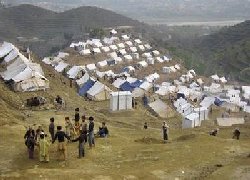Pakistan suffered the highest number of internally displaced people in 2009 due to Pakistan's army attacks on civilian regions where Pakistani Taliban is powerful, a United Nations study showed on Monday.
The number of internally displaced people worldwide reached 27.1 million individuals in 2009, the highest number since records began in the mid 1990s, said the report.
Out of a total population of 170 million, over 3 million Pakistanis were newly displaced in 2009, the most in the world and three times more than second-placed Democratic Republic of Congo.
"The military operations of governments and armed non-state actors caused most displacement, and many people were displaced more than once," said the report, published by the Norwegian Refugee Council, a non-governmental organization.
"The massive scale of displacement witnessed in countries such as Pakistan is a sad reminder that civilians are the ones who pay the highest price of armed conflict," it added.
Pakistani army launched late April a massive offensive first in Swat Valley, breaking the deal between Taliban and government over a Sharee'ah administration.
Taliban gained the right to form provincial administration, implementing Sharee’ah laws in Swat districts under the deal. But Taliban fighters entered neighboring districts, including one just 100 km (60 miles) northwest of Islamabad.
The army spread the attacks to other several regions of the country.
Taliban says the offensive was launched by government to please U.S. who has pressured to break it.
While refugees who cross a country's external border gain rights under international law, internally displaced people who have been forced to move due to conflict or hunger have no such rights in many countries.
Last year also set a new high in the number of displaced persons returning home, at around 5 million.
"Most of the people who were newly displaced during the year were able to return after a few weeks or months of displacement," it said of the Pakistani displacement.
"However, many come back to situations where their homes have been destroyed and are not able to re-establish their lives and livelihoods, or where basic services are not on offer."
The United Nations warned on Monday that food and other relief programs for 3.3 million displaced people in Pakistan would have to be cut back because of the poor international response to an aid appeal.
The world body's humanitarian coordination office OCHA said in Geneva that an appeal launched in February for $537 million had raised only 26 percent of the target.
Nearly 3.5 million people had left their homes in the Khyber Pahtunkwha province, formerly known as the North Western Frontier Province, and the Federally Administered Tribal Areas near the Afghan frontier when the fighting subsided late last year, the U.N. says.
The country with the most internally displaced people continues to be Sudan, with 4.9 million or about one in eight of the population, said the report.
Then came Colombia (3.3 - 4.9 million), Iraq (2.76 million), DRC (1.9 million), Somalia (1.5 million) and Pakistan (1.2 million), the report said.
The report said that displaced women and children were at high risk of rape and sexual violence in a number of countries including Chad, Colombia, DRC, India, Iraq, Kenya, Myanmar, Somalia and Sudan.
PHOTO CAPTION
Children, who are fleeing a military offensive in the Bajaur Agency, play in Walikandawe camp for the internally displaced in Lower Dir district February 22, 2010.
Source: Reuters


 Home
Home Discover Islam
Discover Islam Quran Recitations
Quran Recitations Lectures
Lectures
 Fatwa
Fatwa Articles
Articles Fiqh
Fiqh E-Books
E-Books Boys & Girls
Boys & Girls  Articles
Articles










